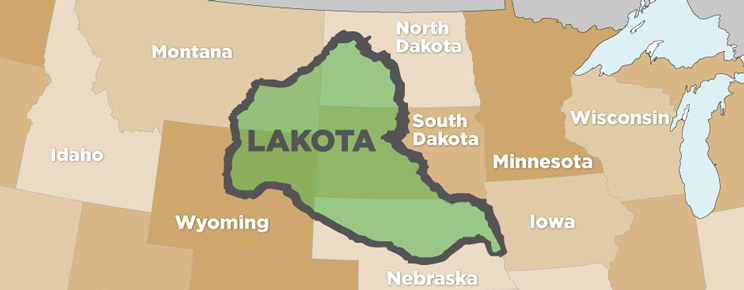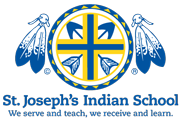Home » Native American Culture » Lakota Language
Lakota Language
Preserving and sharing the Lakota culture is a core part of our mission at St. Joseph’s Indian School and traditional Lakota language is a vital part of that effort. Like many other indigenous languages around the world, Lakota is in danger of being permanently lost.
According to the Lakota Language Consortium, Lakota is one of only eight Native American languages with over 5,000 speakers. However, fluent speakers are aging, making it difficult to continue to teach younger generations.
Across South Dakota, schools, pre-schools, daycare centers and other organizations are working to help revitalize and save the Lakota language. Thanks to these efforts, more language resources are available for learning Lakota than ever before.
Most Native Americans in South Dakota are associated with tribal bands like the Oglala, Sicangu, Mnicoujou and Siha Sapa, which are also part of the Oceti Sakowin — Seven Council Fires. Together, these groups are commonly referred to as the Sioux. They are also recognized by their band’s dialect — Lakota, Dakota or Nakota.

The Lakota people, and therefore the Lakota language, covered a large area of the Midwest at one time.
Lakota speakers usually lived west of the Missouri River in North and South Dakota, as well as northern Nebraska, northeast Wyoming and southeast Montana. Dakota bands were located east of the Missouri River and Nakota speakers lived between these two areas, in what is now southeast South Dakota and northern Iowa.
In 2015, St. Joseph’s Indian School joined forces with the Lakota Language Consortium to help save the Lakota language by giving our students the tools to become fluent Lakota speakers.
LaRayne has taught St. Joseph’s Native American Studies classes for nearly two decades at St. Joseph’s and has seen the success of the new curriculum.
“Our students want to speak Lakota,” she said. “In class when a student hears someone speaking fluently, they just smile and say, ‘Wow! Keep talking like that!’”
In a supportive effort, we will now be following the language standards students are using in our communications with you, our generous supporters. For example, you have seen the word pilamaya — thank you. With the new spelling and diacritics, this will now be philámayaye — thank you.
Some of the words you will see most include:
| New spelling | Old spelling | Meaning |
| Philámayaye | Pilamaya | thank you |
| Wóphila Tȟáŋka | Wopila Tanka | many thanks |
| Thiyóšpaye | Tiyospaye | extended family |
| Wačhípi | Wacipi | powwow |
| Wakȟáŋheža | Wakanyeza | child |
| Thiwáhe | Tiwahe | immediate family |
| Wóžapi | Wojapi | fruit pudding |
| Čhaŋté wašté | Cante waste | good heart |
| Christ Tȟúŋpi | Christ Tunpi | Merry Christmas |
| Wakȟáŋ Tȟáŋka Kičhí Uŋ | Wakan Tanka Kici Un | May God Bless or God Be With You |
| Wakȟáŋ Tȟáŋka | Wakan Tanka | The Great Spirit |
| Ómakȟa Tȟéča Oíyokiphi | Omaka Teca Oiyokipi | Happy New Year! |
| Wačháŋtognaka | Wacantognaka | generosity |
| Waŋblí | Wanbli | eagle |
| Ptaŋyétu | Ptanyetu | fall |
| Kimímela | Kimimila | butterfly |
| Kȟolá | Kola | friend |
| Šúŋka | Sunka | dog |
| Šúŋkawakȟáŋ | Sunkawakan | horse |
| Wičháȟpi owíŋža | Wichahpi owinza | star quilt |
| Tȟatȟáŋka | Tatanka | buffalo |
| Mitákuye Oyás’iŋ | Mitakuye oyasin | We are all related |
There is promise the Lakota language can endure. As students grow in their language skills and become fluent speakers, it can move from endangered to thriving.
After all, the Lakota culture depends on it.
“Without language, there is no culture. We need language in our songs and our ceremonies. We need it in our hearts,” said LaRayne. “We need it in life.”
Philámayaye — thank you — for supporting classroom and cultural opportunities like this for St. Joseph’s students.
Learn Lakota along with our students by watching Lakota Word Wednesday videos on YouTube and Facebook, or by downloading your very own flashcards for free!
Using curriculum from the Lakota Language Consortium, St. Joseph’s students receive language instruction during their Native American Studies classes twice weekly. Their hard work has earned recognition from the Lakota Language Consortium multiple times!
